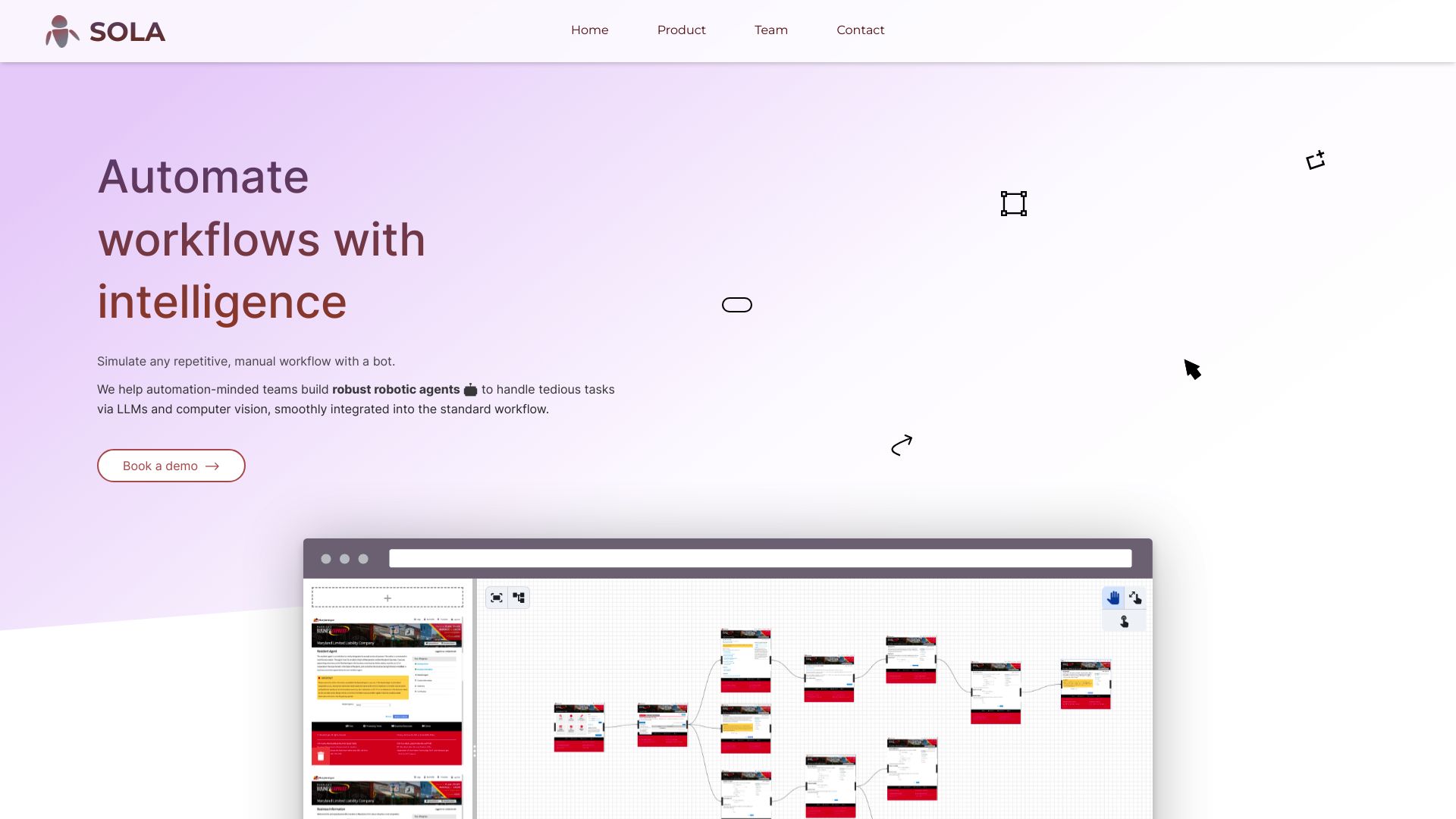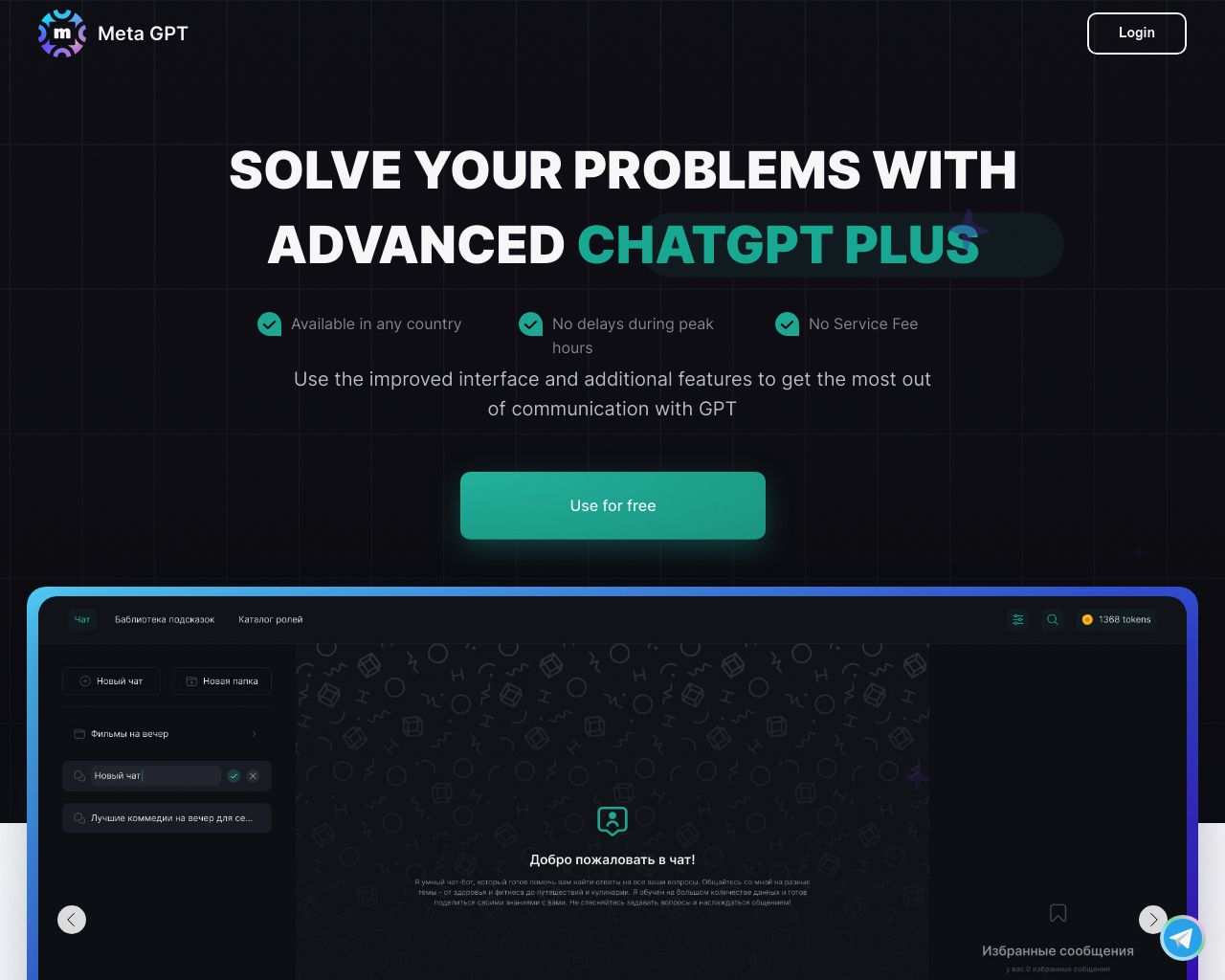Sola vs. MetaGPT: AI Automation Platforms Compared
AI-powered automation revolutionizes how businesses tackle complex tasks and streamline operations. This comparison delves into Sola vs. MetaGPT, and SmythOS, three cutting-edge platforms reshaping workflow automation and software development. We examine their unique approaches, strengths, and limitations to help you choose the ideal solution for your organization’s needs.
Whether you’re a developer seeking powerful APIs, a business leader focused on scalability, or an entrepreneur looking for user-friendly AI tools, this analysis provides valuable insights into the capabilities and potential of each platform. Discover how these innovative solutions can enhance productivity, foster collaboration, and drive innovation in your projects.
Sola Overview
Sola transforms manual workflows into automated processes using AI-powered bots. This open-source platform leverages large language models and computer vision to tackle repetitive tasks across industries. Sola’s intuitive interface allows users to record on-screen actions, annotate steps, and rapidly build intelligent agents without extensive coding knowledge.
Sola transforms manual workflows into automated processes using AI-powered bots. This open-source platform leverages large language models and computer vision to tackle repetitive tasks across industries.


Key features of Sola include a workflow recorder, annotation editor, and bot builder that convert manual processes into AI-powered automations. The platform integrates seamlessly with major browsers and desktop applications, enabling users to automate tasks like data entry, web scraping, and document processing. Sola’s bots can adapt and learn over time, incorporating new logic to handle evolving workflows.
Key features of Sola include a workflow recorder, annotation editor, and bot builder that convert manual processes into AI-powered automations.
Sola caters to various industries, including legal, finance, insurance, and healthcare. In legal settings, it automates incorporation filings and court document submissions. Financial teams use Sola to streamline invoice processing and data aggregation. Insurance companies leverage the platform for claims processing and fraud detection, while healthcare providers automate patient record management and compliance reporting.
While Sola offers powerful automation capabilities, it has some limitations. The platform currently lacks features for multi-agent collaboration and OAuth support. Additionally, there’s no mention of specific staging or production domains for testing environments. Despite these constraints, Sola’s intuitive design and ability to handle complex workflows make it a compelling option for businesses seeking to enhance productivity through AI-powered automation.
MetaGPT Overview
MetaGPT transforms multi-agent collaboration by merging human Standardized Operating Procedures (SOPs) with advanced Large Language Models (LLMs). This open-source framework, developed by researchers from prestigious institutions, simulates a software company’s structure to tackle complex tasks.
MetaGPT assigns distinct roles to AI agents, mirroring traditional software development teams. Product managers, architects, engineers, and quality assurance testers work in concert, leveraging SOPs to encode human workflows into prompt sequences. This approach, encapsulated in the philosophy “Code = SOP(Team),” enhances output consistency and reliability.
MetaGPT transforms multi-agent collaboration by merging human Standardized Operating Procedures (SOPs) with advanced Large Language Models (LLMs).


The platform’s assembly line paradigm breaks complex projects into manageable subtasks, each handled by specialized agents. This method not only improves accuracy but also generates comprehensive documentation throughout the development process. From requirement documents to interface specifications, MetaGPT produces artifacts that bolster the final code’s quality and facilitate human-AI collaboration.
MetaGPT’s strengths lie in its ability to handle intricate software development tasks and produce coherent, high-quality code. The framework excels at reducing errors typically associated with multi-agent systems, such as cascading hallucinations or logic inconsistencies. Its structured approach to AI collaboration sets a new standard for tackling diverse and complex projects across various domains.
MetaGPT’s strengths lie in its ability to handle intricate software development tasks and produce coherent, high-quality code.
However, MetaGPT’s focus on software development processes might limit its immediate applicability in non-technical fields. Users seeking AI solutions for tasks outside the realm of software engineering may find the learning curve steep. Additionally, the platform’s reliance on predefined roles and SOPs could potentially constrain creativity in problem-solving for unconventional challenges.
MetaGPT integrates seamlessly with existing development workflows, leveraging its AI agents to augment human capabilities rather than replace them. This synergy between AI and human expertise positions MetaGPT as a powerful tool for enhancing productivity and innovation in software development projects.
Feature Comparison
Sola and MetaGPT offer distinct approaches to AI-powered automation and development. Sola excels in workflow automation, providing an intuitive interface for recording, annotating, and automating repetitive tasks across various industries. Its strength lies in transforming manual processes into AI-powered bots without requiring extensive coding knowledge.
MetaGPT, on the other hand, focuses on simulating a software company structure for complex development tasks. It assigns distinct roles to AI agents, mirroring traditional software development teams. This approach excels at handling intricate software projects and producing high-quality code with comprehensive documentation.
A significant feature gap exists in multi-agent collaboration. While MetaGPT’s core functionality revolves around orchestrating multiple AI agents in different roles, Sola lacks explicit support for agent collaboration. This limits Sola’s ability to tackle complex, multi-faceted projects that require coordinated efforts across different specializations.
In terms of security, both platforms emphasize robust measures, but differences emerge. Sola mentions strong security protocols, likely including data encryption, but lacks specifics on features like OAuth or IP control. MetaGPT, designed for software development, may offer more granular security controls, though explicit details are not provided in the overview.
We’ve designed SmythOS to bridge these gaps and offer a comprehensive solution. Our platform combines the intuitive workflow automation of Sola with the multi-agent collaboration capabilities of MetaGPT, while adding robust security features and a wide range of deployment options. SmythOS provides OAuth support, IP control, and advanced encryption, ensuring your AI agents operate in a secure environment. Additionally, our platform offers unparalleled flexibility in deployment, allowing you to integrate AI agents seamlessly into your existing systems as APIs, webhooks, or even GPT models.
Feature Comparison Table
| Sola | MetaGPT | SmythOS | |
|---|---|---|---|
| CORE FEATURES | |||
| Hosted Agents (Dev, Production) | ❌ | ✅ | ✅ |
| Visual Builder | ✅ | ❌ | ✅ |
| No-Code Options | ✅ | ❌ | ✅ |
| Debug Tools | ❌ | ✅ | ✅ |
| Multimodal | ❌ | ✅ | ✅ |
| Multi-Agent Collaboration | ❌ | ✅ | ✅ |
| Work as Team | ❌ | ✅ | ✅ |
| SECURITY | |||
| Constrained Alignment | ❌ | ✅ | ✅ |
| IP Control | ❌ | ❌ | ✅ |
| COMPONENTS | |||
| Huggingface AIs | ❌ | ✅ | ✅ |
| Zapier APIs | ❌ | ✅ | ✅ |
| Classifiers | ❌ | ✅ | ✅ |
| Data Lakes | ❌ | ❌ | ✅ |
| DEPLOYMENT OPTIONS (EMBODIMENTS) | |||
| Staging Domains | ❌ | ❌ | ✅ |
| Production Domains | ❌ | ✅ | ✅ |
| Deploy as GPT | ❌ | ✅ | ✅ |
| DATA LAKE SUPPORT | |||
| Hosted Vector Database | ❌ | ❌ | ✅ |
| Sitemap Crawler | ❌ | ❌ | ✅ |
| YouTube Transcript Crawler | ❌ | ❌ | ✅ |
Best Alternative to Sola and MetaGPT
SmythOS stands out as the superior alternative to Sola and MetaGPT, offering a comprehensive platform for AI agent development and deployment. Our drag-and-drop interface combines the intuitive workflow automation of Sola with the multi-agent collaboration capabilities of MetaGPT, while adding robust security features and flexible deployment options. SmythOS supports OAuth, IP control, and advanced encryption, ensuring your AI agents operate in a secure environment. We provide unparalleled deployment flexibility, allowing seamless integration of AI agents into existing systems as APIs, webhooks, or GPT models. Our platform excels in ease of use, offering a visual builder and no-code options that democratize AI development for users of all skill levels.
SmythOS stands out as the superior alternative to Sola and MetaGPT, offering a comprehensive platform for AI agent development and deployment.
SmythOS boasts an extensive feature set, including multimodal capabilities, debug tools, and support for various AI models and integrations. This versatility enables the creation of sophisticated AI solutions for diverse industries and use cases. With SmythOS, users can leverage pre-built API integrations and templates to accelerate development, while still maintaining the ability to customize and fine-tune their AI agents. Our multi-agent orchestration capabilities allow for the creation of complex, collaborative AI systems that can tackle intricate tasks across various domains. By choosing SmythOS, users gain access to a scalable, secure, and feature-rich platform that empowers them to harness the full potential of AI technology, driving innovation and efficiency across their organizations.
Conclusion
Sola, MetaGPT, and SmythOS each offer unique approaches to AI-powered automation and development. Sola excels in intuitive workflow automation, while MetaGPT shines in simulating software development team structures. However, SmythOS emerges as the superior choice, combining the strengths of both platforms while addressing their limitations.
SmythOS provides a comprehensive solution that goes beyond simple automation or software development. Our platform offers unparalleled flexibility, security, and scalability. With features like OAuth support, IP control, and advanced encryption, SmythOS ensures your AI agents operate in a secure environment. The platform’s ability to deploy agents as APIs, webhooks, or even GPT models demonstrates its adaptability to various business needs.
Unlike Sola and MetaGPT, SmythOS excels in multi-agent collaboration, allowing for complex, multi-faceted projects that require coordinated efforts across different specializations. Our intuitive drag-and-drop interface, combined with pre-built API integrations and templates, makes advanced AI functionalities accessible to users with varying levels of technical expertise.
Experience the future of AI automation with SmythOS. Explore our diverse range of AI-powered agent templates to jumpstart your projects, or dive into our comprehensive documentation to unlock the full potential of our platform. Ready to revolutionize your workflow? Create a free SmythOS account today and join the AI-powered revolution in business automation.
Last updated:
Disclaimer: The information presented in this article is for general informational purposes only and is provided as is. While we strive to keep the content up-to-date and accurate, we make no representations or warranties of any kind, express or implied, about the completeness, accuracy, reliability, suitability, or availability of the information contained in this article.
Any reliance you place on such information is strictly at your own risk. We reserve the right to make additions, deletions, or modifications to the contents of this article at any time without prior notice.
In no event will we be liable for any loss or damage including without limitation, indirect or consequential loss or damage, or any loss or damage whatsoever arising from loss of data, profits, or any other loss not specified herein arising out of, or in connection with, the use of this article.
Despite our best efforts, this article may contain oversights, errors, or omissions. If you notice any inaccuracies or have concerns about the content, please report them through our content feedback form. Your input helps us maintain the quality and reliability of our information.
